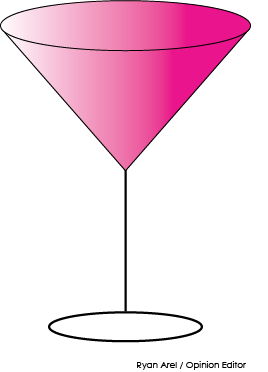Your donation will support the student journalists of Suffolk University. Your contribution will allow us to cover our annual website hosting costs.
Banning double shots and happy hour does not make drinking at bars safer
November 13, 2019

If you’re looking for a half-priced Titos soda, double shots of Jäger or a pitcher of Blue Moon for yourself at the local watering hole, your best bet is to head north to New Hampshire.
In 1984, the Commonwealth banned so-called “happy hours” outright as part of an effort to crack down on alcohol-related accidents. “The state’s new regulation specifically prohibits offering free drinks, discounted drinks or special ‘jumbo’ drinks that cost as much as regular drinks,” a New York Times article proclaiming the ban stated.
Under 204 CMR 4.00, the Alcoholic Beverage Control Commission has the power to enforce a ban on various “happy hour” promotions, including selling a full pitcher of alcohol to a single guest and offering two drinks for the price of one. This last prohibition makes it technically illegal for a double shot of any spirit to be sold.
It’s time Massachusetts ended the prohibition on happy hour, doubles and other forms of alcohol service.
There’s a lot to love about this state, from the brownstones of Back Bay to the quaint charm of Nantucket and the mountains of western Massachusetts. But it’s time to get real with alcohol. It isn’t going away, and neither is our want to consume it.
Such a ban on “happy hour,” doubles and more than two drinks at a time is inconsistent. Patrons of liquor stores are more than welcome to take home as many 30-racks at a time as they like. Are we all collectively naive enough to believe that patrons aren’t going to drink to excess in the privacy of their own homes?
Of course, for some, that’s the difference. Public intoxication is not the same as private intoxication. Chad stumbling around his apartment trying to locate his two-day-old Santarpio’s leftovers at three in the morning is arguably less risky than Brad going to Bell in Hand, ordering a pitcher to himself, pounding it down and getting in his mother’s Volvo to drive back to Melrose.
But current liquor laws have failed to “protect” both Brad and Chad. A fact sheet on drunk driving put out by the Centers for Disease Control and Prevention shows that Massachusetts still has a higher rate of drunk driving than the nation as a whole. In 2012, 21 to 34-year-olds died in drunk driving accidents in the Bay State at twice the national rate. If the whole point of the “happy hour ban” was to lower the rate of drunk driving, it has failed miserably.
Boston is, as a Boston Magazine article on the topic puts it, “a heavy drinking town.” There are approximately 1,109 liquor license holders in Boston, according to the city website, roughly one liquor license for every 625 people. We are also apparently the “sixth booziest brunch state,” according to Boston Business Journal.
If the state government really wanted to make Massachusetts safer, they’d be focusing on reducing harm in ways that actually work.
But make no mistake: the law governing “happy hour” and double shots was never about making people safer. It is and has always been a lame attempt to resurrect the Puritan concept of legislating otherwise personal decisions. The Commonwealth does this all the time; just look at the latest slate of bans. Ironic, considering we rightly recognize self-determination in other areas, such as abortion and LGBTQ+ rights.
In a city with 138,000 college students and a historic sporting history, booze is part of our culture, for better or for worse. Alcohol isn’t going away and we have to accept that.